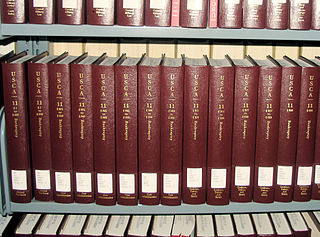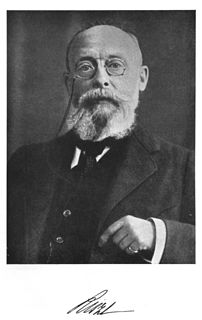
In ordinary language, a crime is an unlawful act punishable by a state or other authority. The term "crime" does not, in modern criminal law, have any simple and universally accepted definition, though statutory definitions have been provided for certain purposes. The most popular view is that crime is a category created by law; in other words, something is a crime if declared as such by the relevant and applicable law. One proposed definition is that a crime or offence is an act harmful not only to some individual but also to a community, society or the state. Such acts are forbidden and punishable by law.
Perjury is the intentional act of swearing a false oath or falsifying an affirmation to tell the truth, whether spoken or in writing, concerning matters material to an official proceeding. In some jurisdictions, contrary to popular misconception, no crime has occurred when a false statement is made while under oath or subject to penalty. Instead, criminal culpability attaches only at the instant the declarant falsely asserts the truth of statements that are material to the outcome of the proceeding. For example, it is not perjury to lie about one's age except if age is a fact material to influencing the legal result, such as eligibility for old age retirement benefits or whether a person was of an age to have legal capacity.

The Code of Laws of the United States of America is the official compilation and codification of the general and permanent federal statutes of the United States. It contains 53 titles. The main edition is published every six years by the Office of the Law Revision Counsel of the House of Representatives, and cumulative supplements are published annually. The official version of those laws not codified in the United States Code can be found in United States Statutes at Large.
Civil procedure is the body of law that sets out the rules and standards that courts follow when adjudicating civil lawsuits. These rules govern how a lawsuit or case may be commenced; what kind of service of process is required; the types of pleadings or statements of case, motions or applications, and orders allowed in civil cases; the timing and manner of depositions and discovery or disclosure; the conduct of trials; the process for judgment; various available remedies; and how the courts and clerks must function.
Sir Alfred Rupert Neale Cross was a prominent English lawyer and academic. He was the second of two sons of Arthur George Cross, an architect in Hastings, and Mary Elizabeth.
Hearsay evidence is "an out-of-court statement offered to prove the truth of the matter asserted therein." In certain courts, hearsay evidence is inadmissible unless an exception to the Hearsay Rule applies.
Glanville Llewelyn Williams was a Welsh legal scholar who was the Rouse Ball Professor of English Law at the University of Cambridge from 1968 to 1978 and the Quain Professor of Jurisprudence at University College, London, from 1945 to 1955. He has been described as Britain's foremost scholar of criminal law.
A rape shield law is a law that limits the ability to introduce evidence or cross-examine rape complainants about their past sexual behavior. The term also refers to a law that prohibits the publication of the identity of an alleged rape victim.
Irving Younger was an American lawyer, law professor, judge, and writer. He is well known among lawyers and law students for his exciting talks on effective trial advocacy and legal history.

Franz Eduard Ritter von Liszt was a German jurist, criminologist and international law reformer. As a legal scholar, he was a proponent of the modern sociological and historical school of law. From 1898 until 1917, he was Professor of Criminal Law and International Law at the University of Berlin and was also a member of the Progressive People's Party in the Prussian Chamber of Deputies and the Reichstag.
Sir Alexander Kingcome Turner was an Auckland-born New Zealand lawyer and judge.
Open Book Publishers (OBP) is an open access academic book publisher based in the United Kingdom. It is a non-profit social enterprise and community interest company (CIC) that promotes open access for full academic monographs, critical editions and textbooks in the Humanities, Social Sciences, Mathematics and Science. All OBP books are peer-reviewed.
A Treatise on Crimes and Misdemeanours or Russell on Crime is a book originally written by William Oldnall Russell. For the purpose of citation, its name may be abbreviated to Russ Cr.
The administration of justice is the process by which the legal system of a government is executed. The presumed goal of such administration is to provide justice for all those accessing the legal system. The phrase is also used commonly to describe a University degree, which can be a prerequisite for a job in law enforcement or government.
Card, Cross and Jones: Criminal Law, formerly published as An Introduction to Criminal Law and as Cross and Jones' Introduction to Criminal Law, and referred to as Cross and Jones, is a book about the criminal law of England and Wales, originally written by Sir Rupert Cross and Philip Asterley Jones, and then edited by them and Richard Card. It was published by Butterworths and is now published by Oxford University Press.
Civil law is a branch of the law. In common law legal systems such as England and Wales, the law of Pakistan and the law of the United States, the term refers to non-criminal law. The law relating to civil wrongs and quasi-contracts is part of the civil law, as is law of property. Civil law may, like criminal law, be divided into substantive law and procedural law. The rights and duties of persons amongst themselves is the primary concern of civil law. It is often suggested that civil proceedings are taken for the purpose of obtaining compensation for injury, and may thus be distinguished from criminal proceedings, whose purpose is to inflict punishment. However, exemplary damages or punitive damages may be awarded in civil proceedings. It was also formerly possible for common informers to sue for a penalty in civil proceedings.
Sir Stephen George Mitchell QC, styled The Hon. Mr Justice Mitchell, is a former judge of the High Court of England and Wales assigned to the Queen's Bench Division.






